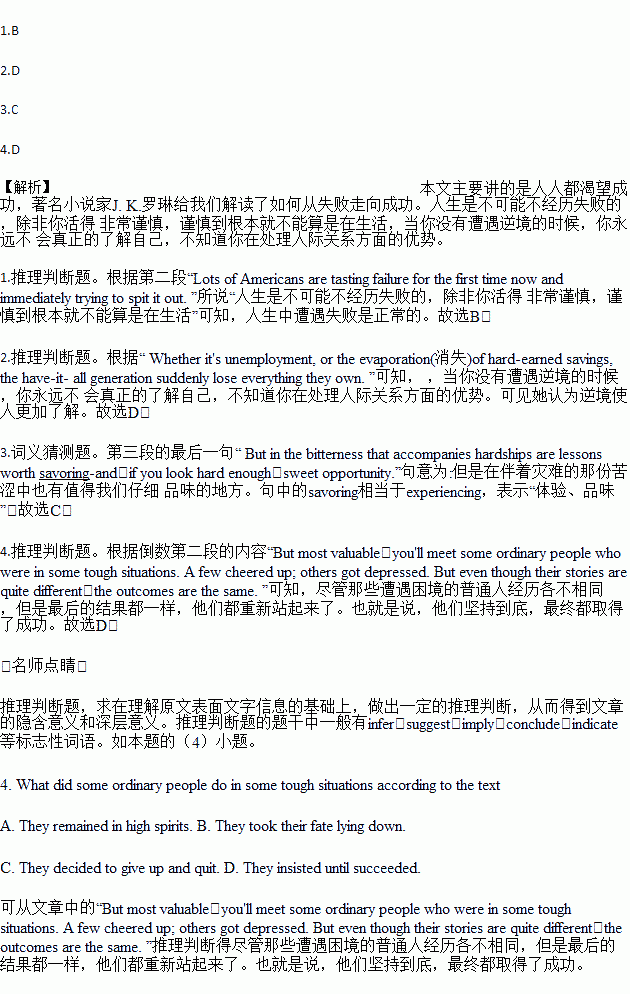题目内容
Sometimes life trips you up,but knowing how to approach failure can be the first step to success. When author J. K. Bowling addressed the graduating class at Harvard last June,she didn't focus on success. Instead,she spoke about failure. She related a story about a young woman who gave up her dream of writing novels to study something more practical. However,she ended up as an unemployed single mom. But during this hard time,she realized she still had a wonderful daughter,an old typewriter,and an idea that would become the foundation for rebuilding her life.“Perhaps you've heard of Harry Pottery You might never fail on the scale I did,” Bowling told the audience.“But it is impossible to live without failing at something,unless you live so cautiously that you might as well not have lived at all. You will never truly know yourself , or the strength of your relationships,until both have been tested by hardships. Such knowledge is a true gift, for it is painfully won,and it has been worth more to me than any qualification I ever earned.”
Lots of Americans are tasting failure for the first time now and immediately trying to spit it out. Whether it's unemployment, or the evaporation(消失)of hard-earned savings, the have-it- all generation suddenly lose everything they own. But in the bitterness that accompanies hardships are lessons worth savoring-and,if you look hard enough,sweet opportunity.
Next,you'll learn how the brain responds to failure and how it can be reprogrammed for success using some simple tricks. You'll also find advice from a successful entrepreneur(企业家)who claims that times like these are actually among the best for launching dreams. But most valuable,you'll meet some ordinary people who were in some tough situations. A few cheered up; others got depressed. But even though their stories are quite different,the outcomes are the same. They all bounced back. And you can too.
As Bowling herself would admit, it doesn't take a wizard(奇才)to do it.
1.We learn from Paragraph 2 that .
A. college students have never suffered a defeat
B. it is normal for you to fail at something in life
C. if you are very cautious,you can enjoy your life
D. you need a daughter and a typewriter to succeed
2.Which of the following statements would J. K. Bowling agree toy
A. The knowledge we accumulate is a true gift for us.
B. Our experience is more valuable than qualifications.
C. We can understand ourselves better in time of danger.
D. Our bitter experience helps us to realize our strength.
3.The underlined word “savoring" in Paragraph 3 probably means .
A. learning B. enjoying
C. experiencing D. absorbing
4.What did some ordinary people do in some tough situations according to the text
A. They remained in high spirits. B. They took their fate lying down.
C. They decided to give up and quit. D. They insisted until succeeded.
 天天向上一本好卷系列答案
天天向上一本好卷系列答案 小学生10分钟应用题系列答案
小学生10分钟应用题系列答案Secret codes(密码)keep messages private. Banks, companies, and government agencies use secret codes in doing business, especially when information is sent by computer.People have used secret codes for thousands of years.1.Code breaking never lags(落后)far behind code making. The science of creating and reading coded messages is called cryptography.There are three main types of cryptography.2.For example, the first letters of “My elephant eats too many eels” spell out the hidden message “Meet me.” 3.You might represent each letter with a number, for example. Let’s number the letters of the alphabet, in order, from 1 to 26. If we substitute a number for each letter, the message “Meet me” would read “135520135.”A code uses symbols to replace words, phrases, or sentences. To read the message of a real code, you must have a code book.4.For example, “bridge” might stand for “meet” and “out” might stand for “me.” The message “Bridge out” would actually mean “Meet me.”5.However, it is also hard to keep a code book secret for long. So codes must be changed frequently.
A. It is very hard to break a code without the code book. |
B. In any language, some letters are used more than others. |
C. Only people who know the keyword can read the message. |
D. As long as there have been codes, people have tried to break them. |
E. You can hide a message by having the first letters of each word spell it out. |
F. With a code book, you might write down words that would stand for other words. |
G. Another way to hide a message is to use symbols to stand for specific letters of the alphabet. |


 ney
ney C. in D. towards
C. in D. towards